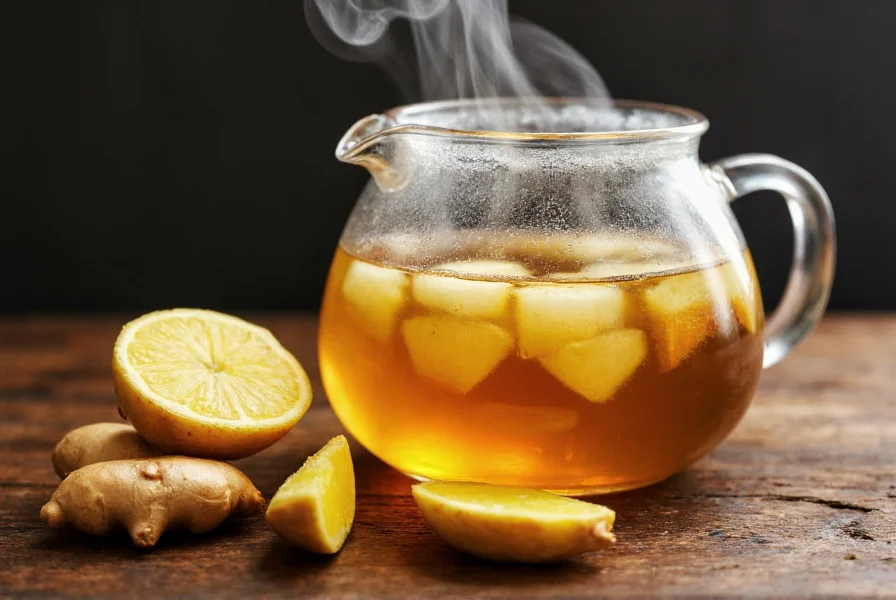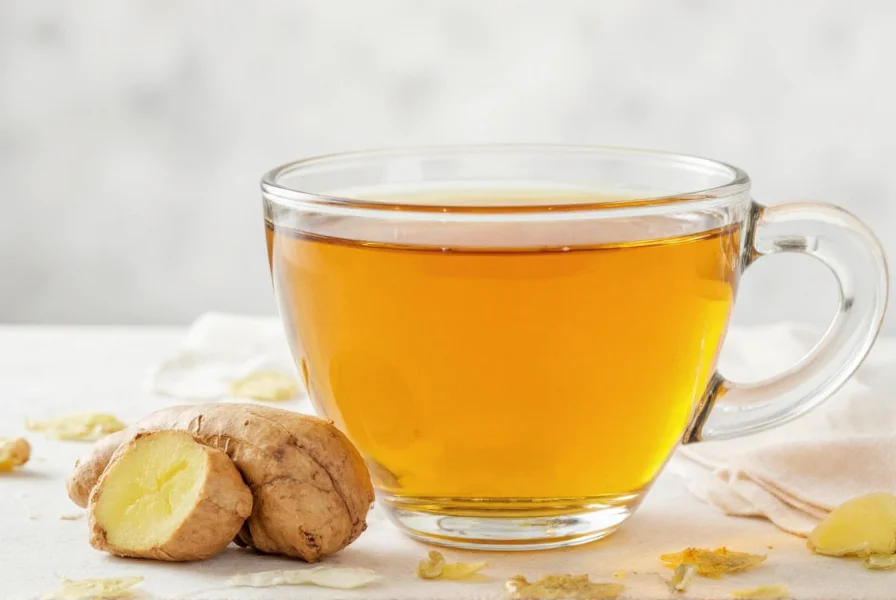Many people reach for ginger tea when headaches strike, seeking a natural remedy with minimal side effects. This ancient root has been used for centuries in traditional medicine systems across Asia and the Middle East for various ailments, including pain relief. Modern research is now examining whether these traditional uses have scientific merit, particularly for headache management.
The Science Behind Ginger and Headache Relief
Ginger contains bioactive compounds like gingerols and shogaols that demonstrate anti-inflammatory and pain-relieving properties. These compounds may help with headaches through several mechanisms:
- Inhibiting prostaglandin synthesis, which contributes to pain and inflammation
- Reducing serotonin fluctuations associated with migraines
- Blocking calcium channels involved in migraine pathways
- Preventing blood vessel constriction that triggers migraines
A randomized controlled trial published in Phytotherapy Research (2020) compared 250mg of ginger powder to 50mg of sumatriptan (a common migraine medication) in 100 migraine sufferers. Both groups experienced significant pain reduction within two hours, with ginger showing fewer side effects. However, this study used ginger powder, not tea, and focused specifically on migraines rather than tension headaches.
How Ginger Tea May Help Different Headache Types
| Headache Type | Ginger Tea Effectiveness | Research Support |
|---|---|---|
| Migraines | Moderate to high | Strongest evidence; multiple studies show benefit when taken early |
| Tension Headaches | Mild to moderate | Limited studies; may help with stress-related components |
| Sinus Headaches | Moderate | May reduce inflammation but not primary treatment |
| Cluster Headaches | Minimal | Little evidence of effectiveness |
The effectiveness of ginger tea varies significantly by headache type. Migraine sufferers appear to benefit most, particularly when consuming ginger at the first sign of symptoms. For tension headaches, ginger's potential stress-reducing properties might provide some relief, though evidence is less robust. Sinus headache relief may come from ginger's anti-inflammatory effects, but it shouldn't replace targeted sinus treatments.
Preparing Ginger Tea Specifically for Headache Relief
Not all ginger tea preparations deliver the same potential benefits for headaches. To maximize the therapeutic compounds:
- Use fresh ginger root: Peel and slice 1-2 inches of fresh ginger (about 20-30g)
- Simmer, don't boil: Steep in 2 cups of water just below boiling point for 10-15 minutes
- Concentrate the brew: Reduce to 1 cup for stronger concentration of active compounds
- Add complementary ingredients: Lemon (vitamin C enhances absorption) or a pinch of black pepper (increases bioavailability)
- Consume promptly: Drink immediately after preparation for maximum potency

Optimal Timing and Dosage for Headache Management
When using ginger tea for headaches, timing and dosage significantly impact effectiveness:
- For migraines: Consume at first sign of symptoms; may prevent progression to severe pain
- Dosage: Aim for 250-500mg of ginger compounds (approximately 1-2 teaspoons of strong ginger tea)
- Frequency: Can be repeated every 4 hours as needed, up to 4g total daily ginger intake
- Preventive use: Some find benefit from daily consumption (1g ginger) to reduce migraine frequency
A 2014 study in the Journal of Ethnopharmacology suggested that ginger's effects peak between 30-60 minutes after consumption, making it valuable for early intervention. However, individual responses vary considerably based on metabolism and headache triggers.
When Ginger Tea Isn't Enough: Important Limitations
While ginger tea shows promise as a natural headache remedy, it has significant limitations that users should understand:
- Effectiveness varies widely between individuals
- Works best for mild to moderate headaches, not severe migraines
- May take 30-60 minutes to provide relief, unlike faster-acting medications
- Not suitable for all headache types (particularly cluster headaches)
- Long-term daily use may cause gastrointestinal issues in some people
Research published in Cephalalgia indicates that natural remedies like ginger work best as part of a comprehensive headache management plan that includes identifying triggers, stress management, and proper hydration. Ginger tea should complement—not replace—medical treatment for chronic or severe headaches.
Safety Considerations and Potential Interactions
Ginger is generally safe for most adults, but certain precautions apply when using it for headache relief:
- Blood thinners: Ginger may enhance effects of medications like warfarin
- Diabetes medications: May lower blood sugar levels further
- Gallstones: Could increase bile production, potentially causing discomfort
- Pregnancy: Consult physician before regular use (moderate amounts in food are generally safe)
- Surgery: Discontinue at least 2 weeks before scheduled procedures
The American Migraine Foundation notes that while ginger has fewer side effects than many migraine medications, it's not risk-free. Common side effects include heartburn, diarrhea, and mouth irritation, particularly at higher doses. If you experience worsening headaches or new symptoms after using ginger tea, discontinue use and consult a healthcare provider.
Comparing Ginger Tea to Other Natural Headache Remedies
When considering natural headache solutions, understanding how ginger tea compares to alternatives helps make informed choices:
- Peppermint oil: More effective for tension headaches; works via different mechanism (topical application)
- Feverfew: Better for migraine prevention than acute treatment
- Magnesium supplements: More effective for prevention than immediate relief
- Caffeine: Can help initially but may cause rebound headaches
A 2022 review in Headache: The Journal of Head and Face Pain suggested that combining ginger with other natural approaches (like proper hydration and stress reduction techniques) yields better results than any single remedy alone. For immediate relief, ginger tea may work faster than supplements but slower than prescription medications.
When to Seek Professional Medical Help
Natural remedies like ginger tea have their place, but certain headache characteristics require professional evaluation:
- Headaches that suddenly become severe or different from usual patterns
- Pain that worsens despite home treatment
- Headaches accompanied by fever, stiff neck, or confusion
- Headaches following head injury
- Visual disturbances that persist after headache resolves
- More than 15 headache days per month
The American Headache Society emphasizes that while natural remedies can be part of headache management, they shouldn't delay diagnosis of serious underlying conditions. If you find yourself needing ginger tea or other remedies more than twice weekly, consult a healthcare provider to develop a comprehensive treatment plan.
Conclusion: Ginger Tea as Part of Headache Management
Ginger tea shows promise as a natural option for managing certain types of headaches, particularly migraines when used at symptom onset. While research supports its potential benefits, it's not a universal solution and works best as part of a broader headache management strategy. The anti-inflammatory and pain-relieving properties of ginger compounds offer a gentler alternative to some medications, with fewer side effects for many users.
For those interested in natural headache remedies, ginger tea represents a scientifically supported option worth trying—but with realistic expectations about its limitations. Always prioritize professional medical advice for persistent or severe headaches, and consider ginger tea as one tool among many in your headache management toolkit.
How quickly does ginger tea work for headaches?
Ginger tea typically begins working within 30-60 minutes when consumed at the first sign of headache symptoms. Research suggests peak effectiveness occurs around 60 minutes after consumption, making it valuable for early intervention in migraine attacks. For best results, drink strong ginger tea as soon as you notice headache symptoms developing.
Can ginger tea prevent migraines?
Some studies suggest that daily ginger consumption (about 1g) may help reduce migraine frequency over time. A 2019 study found that participants who took ginger supplements daily experienced fewer migraine days per month. While ginger tea contains lower concentrations than supplements, regular consumption might contribute to preventive effects for some individuals, though it's generally more effective for acute treatment than prevention.
How much ginger should I use for headache relief tea?
For headache relief, use 20-30g (about 1-2 inches) of fresh ginger root per cup of water. Simmer for 10-15 minutes to extract maximum active compounds. This concentration provides approximately 250-500mg of gingerols, the compounds studied for migraine relief. Stronger concentrations may increase effectiveness but also raise the risk of gastrointestinal side effects in sensitive individuals.
Is ginger tea safe for frequent headache sufferers?
Ginger tea is generally safe for most people when consumed in moderation (up to 4g of ginger daily). However, frequent headache sufferers should consult a healthcare provider before regular use, especially if taking medications like blood thinners or diabetes drugs. Long-term daily use may cause mild gastrointestinal issues in some people. If you experience headaches more than 15 days monthly, seek professional medical advice rather than relying solely on ginger tea.
Can children use ginger tea for headaches?
Ginger tea may be used for children over 2 years old for headache relief, but with reduced concentration (½ teaspoon of grated ginger per cup). Consult a pediatrician before regular use, especially for children under 6. The American Academy of Pediatrics notes that while ginger is generally safe, children metabolize compounds differently than adults. Never give ginger tea to infants, and discontinue use if any adverse reactions occur.











 浙公网安备
33010002000092号
浙公网安备
33010002000092号 浙B2-20120091-4
浙B2-20120091-4